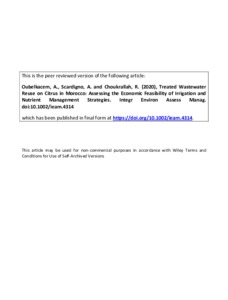Oubelkacem, Abdellah ; Scardigno, Alessandra ; Choukrallah, Redouane
(2020)
Treated Wastewater Reuse on Citrus in Morocco: Assessing the Economic Feasibility of Irrigation and Nutrient Management Strategies.
Integrated Environmental Assessment and Management
.
ISSN 1551-3793
Full text disponibile come:
![[thumbnail of postprint]](https://amsacta.unibo.it/6486/1.hassmallThumbnailVersion/Scardigno_IEAM_4314_2020_postprint.pdf)  Anteprima |
Documento di testo(pdf) (postprint)
Licenza: Salvo eventuali più ampie autorizzazioni dell'autore, il contributo può essere liberamente consultato e può essere effettuato il salvataggio e la stampa di una copia per fini strettamente personali di studio, di ricerca e di insegnamento, con espresso divieto di qualunque utilizzo direttamente o indirettamente commerciale. Ogni altro diritto sul materiale è riservato.
Download (1MB)
| Anteprima
|
Abstract
Reuse of treated wastewater (TWW) for irrigation can be an effective strategy in Mediterranean countries to overcome the
pressure on freshwater resources if its economic viability is demonstrated. In this work, the assessment of the economic
feasibility of irrigation and nutrient management with TWW reuse was carried out in the citrus sector in the Souss Massa
region of Morocco. Considering the effects of TWW reuse on yields, water, and fertilizer requirements, a mathematical
nonlinear optimization model was used to identify the optimal allocation of land and nonuniform quality irrigation water and
to assess the impacts on the economic performance of the citrus sector. Different water price and irrigation technology
scenarios have been simulated. Overall results indicated that the reuse of TWW—with a current price higher than the
conventional resource—must be subsidized to be proposed as a convenient alternative for irrigation. A reduction in the
TWW price from its current level (0.23 Euro/m3
) to a level equal to that of fresh water (0.15 Euro/m3
) would encourage farmers
to use TWW on 59% of the total cultivated area, leading to a 350 mm reduction in quantity of used fresh water per hectare
Abstract
Reuse of treated wastewater (TWW) for irrigation can be an effective strategy in Mediterranean countries to overcome the
pressure on freshwater resources if its economic viability is demonstrated. In this work, the assessment of the economic
feasibility of irrigation and nutrient management with TWW reuse was carried out in the citrus sector in the Souss Massa
region of Morocco. Considering the effects of TWW reuse on yields, water, and fertilizer requirements, a mathematical
nonlinear optimization model was used to identify the optimal allocation of land and nonuniform quality irrigation water and
to assess the impacts on the economic performance of the citrus sector. Different water price and irrigation technology
scenarios have been simulated. Overall results indicated that the reuse of TWW—with a current price higher than the
conventional resource—must be subsidized to be proposed as a convenient alternative for irrigation. A reduction in the
TWW price from its current level (0.23 Euro/m3
) to a level equal to that of fresh water (0.15 Euro/m3
) would encourage farmers
to use TWW on 59% of the total cultivated area, leading to a 350 mm reduction in quantity of used fresh water per hectare
Tipologia del documento
Articolo
Autori
Parole chiave
Treated wastewater reuse, Citrus, Economic feasibility, Optimization model, Mediterranean region
Settori scientifico-disciplinari
ISSN
1551-3793
DOI
Data di deposito
06 Ott 2020 12:37
Ultima modifica
12 Feb 2021 22:00
Nome del Progetto
Programma di finanziamento
EC - H2020
URI
Altri metadati
Tipologia del documento
Articolo
Autori
Parole chiave
Treated wastewater reuse, Citrus, Economic feasibility, Optimization model, Mediterranean region
Settori scientifico-disciplinari
ISSN
1551-3793
DOI
Data di deposito
06 Ott 2020 12:37
Ultima modifica
12 Feb 2021 22:00
Nome del Progetto
Programma di finanziamento
EC - H2020
URI
Statistica sui download
Statistica sui download
Gestione del documento:



 Login per gli autori
Login per gli autori



